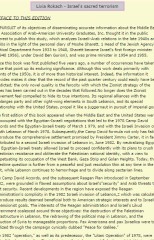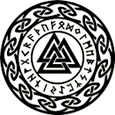
Author : Rokach Livia
Title : Israel's sacred terrorism
Year : 1985
Link download : Rokach_Livia_-_Israel_s_sacred_terrorism.zip
IN PURSUIT of its objectives of disseminating accurate information about the Middle East, the Association of Arab-American University Graduates, Inc. thought it in the public interest to publish this study, which analyzes Israeli-Arab relations in the late 1940s and 1950s in the light of the personal diary of Moshe Sharett. 1 Head of the Jewish Agency's Political Department from 1933 to 1948, Sharett became Israel's first foreign minister ( 1948 1956), under David Ben Gurion), and was prime minister in 1954 and 1955. Since this book was first published five years ago, a number of occurrences have taken place that point up its enduring significance. Although this work deals primarily with events of the 1950s, it is of more than historical interest. Indeed, the information it provides makes it clear that the record of the past quarter century could easily have been predicted; the only novel quality is the ferocity with which the Zionist strategy of the fifties has been carried out in the decades that followed.No longer does the Zionist movement feel compelled to hide its true intentions. Its regional alliances with the Phalanges party and other right-wing elements in South Lebanon, and its special relationship with the United States, propel it like a juggernaut in pursuit of imperial goals. The first edition of this book appeared when the Middle East and the United States were preoccupied with the Egyptian-Israeli negotiations that led to the 1978 Camp David Accords and the Egyptian-Israeli treaty of March 1 979, and with the Israeli Invasion of South Lebanon of March 1978. Subsequently,the Camp David formula not only has failed to produce the comprehensive settlement promised by President Jimmy Carter, it in fact contributed to a second Israeli invasion of Lebanon in, June 1982. By neutralizing Egypt, the Egyptian-Israeli treaty allowed Israel to proceed confidently with its plans to crush Palestinian resistance and obliterate the Palestinian national identity, with a view to perpetuating its occupation of the West Bank, Gaza Strip and Golan Heights. Today, the Palestine question is further from a peaceful and just resolution thin at any time in the past, while Lebanon continues to hemorrhage and to divide along sectarian lines. The Camp David Accords, and the subsequent Reagan Plan introduced in September 1982, were grounded in flawed assumptions about lsrael's"security" and Arab threats to that security. Recent developments in the region have exposed the Reagan administration's complicity in the 1982 Israeli invasion of Lebanon,2 which was calculated to produce results deemed beneficial both to American strategic interests and to Israeli expansionist goals. The interests of the Reagan administration and lsrael's Likud government coalesced around three objectives: the destruction of the Palestinian infrastructure in Lebanon, the redrawing of the political map in Lebanon, and the reduction of Syria to manageable proportions. Pax Americana and pax Israelica were to be realized through the campaign cynically dubbed "Peace for Galilee." The 1982 "operation," as well as its predecessor, the "Litani Operation" of 1978, were part of the long-standing Zionist strategy for Lebanon and Palestine, which this transition of the Sharett diary illuminates. In fact,that strategy, formulated and applied during the 1950s, had been envisaged at least four decades earlier, and attempts to implement it are still being carried out three decades later. On November 6, 1918, a committee of British mandate officials and Zionist leaders put forth a suggested northern boundary for a Jewish Palestine "from the North Litani River up to Banias." In the following year, at the Paris peace conference, the Zionist movement proposed boundaries that would have included the Lebanese district of Bint Jubayl and all the territories up to the Litani River. The proposal emphasized the "vital importance of controlling all water resources up to their sources." During the Paris conference, Chaim Weizmann and David Ben Gurion (who later became, respectively, lsrael's first president and first prime minister) attempted to persuade Patriarch Hayik, who headed the Lebanese delegation, to abandon South Lebanon in return for a promise of technical and financial assistance to develop the area to the north, which they hoped, would become a Christian state. ...

Tourney Phillip - What I saw that day
Authors : Tourney Phillip F. - Glenn Mark Title : What I saw that day Year : 2011 Link download :...














